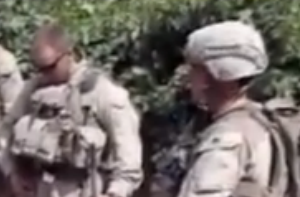General James Amos, the Marine commandant, on the left, and Lieut. General Thomas Waldhauser, who Amos removed as the corps' investigator into the Taliban desecration case.
Military justice can be a strange beast, with its own rules and customs that sets it apart from the civilian world. The contrast is on stark display in the mushrooming debate over the Marine Corps’ investigation into the case of Marines urinating on Taliban corpses in Afghanistan in July 2011.
It seems like a slam-dunk case. After all, the Marines were videotaped desecrating the dead. The video appeared on YouTube in January 2012, the corps denounced the episode, and the Marines involved have been punished.
But that’s akin to looking at an iceberg and believing that all there is to it is what you can see. Beneath the waves, the case has become a sea-going monster whose tentacles are now wrapped around the Marine’s top officer.
Some former Marines are charging that General James Amos, the 35th Marine commandant and a member of the Joint Chiefs of Staff, exerted “unlawful command influence” in an effort to assure that all involved were “crushed” and tossed out of the corps.
In an extraordinary nine-page letter submitted to the Pentagon inspector general this week, one-time Marine lawyer John Dowd lays out what he calls a case of “insidious unlawful command influence, unlawful classification, abuse of the process, false swearing and obstruction of justice” that he asserts Amos championed. It follows a letter to Congress last month signed by more than two dozen former Marine and Navy officers asking lawmakers to look into the case.
In a nutshell, shortly after the video became public, Amos appointed Lieut. General Thomas Waldhauser to investigate the matter. Two weeks later, Waldhauser told Amos that he didn’t think the cases warranted courts-martial. “At that meeting CMC [commandant of the Marine Corps] expressed his displeasure with the plan, said that instead he wanted to `crush’ the Marines, get them out of the Corps, and suggested they be sent to General Court Martial,” Dowd’s letter says. Within hours, Amos replaced Waldhauser with another general.
The case involves a multitude of Marines, some charged with wrongdoing and others charged with investigating it. It’s the investigators’ roles that are the most interesting — Amos’ memo removing Waldhauser from the probe because of what Amos told Waldhauser about what he allegedly wanted to happen, and Waldhauser’s recollection of that meeting. It offers a rare and unvarnished peek at the underbelly of military justice. “This case is the worst case of unlawful command influence by the Commandant his subordinates and his counsel in the history of the Marine Corps,” Dowd claims in his letter.
Amos disagrees. “The commandant considers his responsibility to uphold the integrity of the military justice system to be sacred,” says his spokesman, Lieut. Colonel David Nevers. A Marine associate of the commandant says privately that “much of the drama is contrived,” but not everyone sees it that way. The allegations swirling around Amos “have shaken the institution to its core,” says Andrew deGrandpre, managing editor of the independent Marine Corps Times newspaper, which has been covering the case for months.
Part of the Marine ethos is to back fellow Marines, especially those serving on the front lines. The fact that Amos is the first aviator to serve as commandant, instead of a ground-pounder, has played a role in the anger the case has generated inside the corps, some Marines say.
The Marines involved in the case have either left the corps, or are expected to hang up their Marine uniforms soon. That suggests, according to Waldhauser’s July statement, that Amos will get his way. “The CMC went on to say,” Waldhauser recalled of their February 2012 meeting in an unidentified Middle Eastern country, “that he wanted these Marines to be discharged from the Marine Corps when this was all over.”
Inside the Pentagon, some wonder if Amos faces a similar fate. He has about a year left on the commandant’s standard four-year tenure, but some question whether he will make it. “Some very powerful people in the Marine Corps.” deGrandpre says, “are sweating the inspector general’s findings.”


